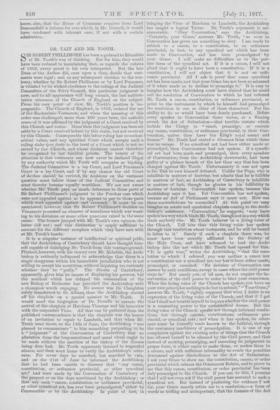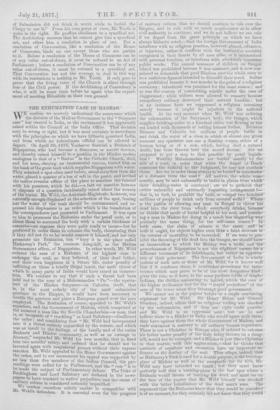DR. TAIT AND MR. TOOTH, S IR ROBERT PHILLIMORE has been
a godsend to Ritualists of Mr. Tooth's way of thinking. But for him, they would have been reduced to maintaining that, as regards the rubrics of 1662, every priest is his own interpreter. But the late Dean of the Arches did, once upon a time, decide that vest- ments were legal ; and as any subsequent decision to the con- trary, whether by Sir Robert Phillimore or by Lord Penzance, is vitiated by its wicked obedience to the rulings of the Judicial Committee of the Privy Council, this particular judgment is now, and to all appearance will long remain, the last authori- tative utterance of the Church of England on the subject. From his own point of view, Mr. Tooth's position is im- pregnable. The Church of England, in 160, ordered the use of the Eucharistic Vestments, and when the meaning of this order was challenged, more than 200 years later, tho catholic sense of it was affirmed by the judgment of a Court received by this Church and realm. Since then this judgment has been set aside by a Court received indeed by this realm, but not received by this Church. Consequently this latter ruling has no ecclesi- astical value, and any spiritual Court which accepts such a ruling sinks ipso facto to the level of a Court which is not re- ceived by the Church, and whose decisions cannot therefore be recognised by her faithful priests. The beauty of the situation is that vestments can now never be declared illegal by any authority which Mr. Tooth will recognise as binding. The Judicial Committee is a lay Court, and Lord Penzance's Court is a lay Court, and if by any chance the old Court of Arches should be revived, its decisions on the vestment question must follow those of the Judicial Committee, and must thereby become equally worthless. We are not aware whether Mr. Tooth pays as much deference to those parts of Sir Robert Phillimore's judgment in the Purchas case which were not appealed against as he appears to pay to those parts which were appealed against and reversed. It must, be re- membered, however, that Sir Robert Phillimore's decision on Vestments possessed an element of soundness which was want- ing to his decisions on some other questions raised in the same canse. The former jumped with Mr. Tooth's own opinion, the latter did not ; and this distinction is amply sufficient to account for the different reception which they have met with at Mr. Tooth's hands.
It is a singular instance of intellectual or spiritual pride, that the Archbishop of Canterbury should have thought him- self capable of dislodging Mr. Tooth from this vantage-ground. Flushed, however, with his victory over Mr. Ridsdale, the Arch- bishop is evidently indisposed to acknowledge that there is a single clergyman within his immediate jurisdiction who is not willing to accept his monitions, without inquiring too curiously whether they be "godly." The diocese of Canterbury, apparently, gives him no means of displaying his prowess, but the accident which has delayed the consecration of the new Bishop of Rochester has provided the Archbishop with a champion worth engaging. No sooner was Dr. Claughton safely transferred to St. Albans, than the Archbishop started off his chaplain on a special mission to Mr. Tooth. It would need the biographer of Dr. Proudie to narrate the arrival of the chaplain at Hatcham Vicarage and his interview with the suspended Vicar. All that can be gathered from the published correspondence is that the chaplain was the bearer of an invitation to repair to Lambeth, and that when Mr. Tooth went there, on the 14th of June, the Archbishop "was pleased to communicate" to him something purporting to be a " judgment " of the Convocation of Canterbury that no alteration from the long-sanctioned and usual ritual ought to be made without the sanction of the bishop of the diocese being first had. Mr. Tooth apparently listened in respectful silence, and then went home to verify the Archbishop's refer- ence. For seven days he searched, but searched in vain, and on the 21st of June he informed the Archbishop that he had been unable to discover that "any canon, constitution, or ordinance provincial, or other synodical ad," had been made by the Convocation of Canterbury of the purport or on the days mentioned by the Archbishop ; or that any such "canon, constitution, or ordinance provincial, or other synodical act, has ever been promulgated," either by Convocation or by the Archbishop. In point of fact, in bringing the Vicar of Hatch= to Lambeth, the Archbishop has caught a logical Tartar. Mr. Tooth's argument is un- answerable. Obey Convocation,' says the Archbishop.
Certainly, your Grace,' answers Mr. Tooth, as soon as Convocation has given me something to obey. I am ready to submit to a canon, to a constitution, to an ordinance provincial, in fact, to any synodical act which has been made in Convocation, and has been promulgated by your Grace. I will make no difficulties as to the pre- cise form of the synodical act. If it is a canon, I will not plead that it ought to have been a constitution. If it is a constitution, I will not object that it is not an ordi- nance provincial. All I ask. is proof that some synodical act has been made, and that your Grace has not been so ashamed of it when made as to decline to promulge it.' It is easy to imagine how the Archbishop must have wished that he could call the resolution of Convocation to which he had referred Mr. Tooth a canon, constitution, or ordinance provincial, or point to the instrument by which he himself had promulged the resolution in one or other of these characters. But the ability to do so would have been dearly purchased. Before every speaker in Convocation there waves, as a flaming sword, the Act of Submission—that terrible statute which forbids the Clergy to " enact, promulge, or execute any canon, constitution, or ordinance provincial, in their Con- vocation, unless they have the King's royal assent and license." Mr. Tooth had stated a dilemma from which there was no escape. If no synodical act had been either made or promulged, then Convocation had not spoken. If a synodi- cal act had been made and promulged, then every member of Convocation, from the Archbishop downwards, had been guilty of a plainer breach of the law than any that has been charged against Mr. Tooth. Unfortunately it was not open to Dr. Tait to own himself defeated. Unlike the Pope, who is infallible in matters of doctrine, but admits that he is fallible in matters of fact, an Archbishop of Canterbury is infallible in matters of fact, though he glories in his fallibility in matters of doctrine. Convocation has spoken, because the Archbishop says it has. Yet Convocation has not spoken, because an Act of Parliament says it must not. How can these contradictions be reconciled ? At this point we may imagine an astute and casuistical chaplain coming to the Arch- bishop's assistance. 'Convocation,' ho suggests, 'may hav& spoken in a way which binds Mr. Tooth, though not in a way which binds anybody else. Mr. Tooth believes in a Jiving voice of the Church. Tell him that this living voice has spoken through this resolution about vestments, and he will be bound to listen to it.' Surely if such a chaplain there was, he must have been secretly affiliated to the Society of the Holy Cross, and have schemed to lead the Arch- bishop into the net which Mr. Tooth had spread for him. "It is quite true," writes, the Archbishop, "that the reso- lution to which I referred you was neither a canon nor a constitution nor a synodical act, nor has it been either made, promulged, or executed. 'No decision of Convocation can answer to such conditions, except in cases where the civil power steps in.' But surely you, of all men, do not require the in- tervention of the civil power in order to bind your conscience. When the living voice of the Church has spoken, you have on your own principles nothingto do but to submit." "Your Grace," answers Mr. Tooth, "rightly supposes that what I desire is an expression of the living voice of the Church, and that if I get that I shall not trouble myself to inquire whether the civil power is a consenting power to the ecclesiastical decree. But the living voice of the Church speaks not through informal resolu- tions, but through canons, constitutions, ordinances pro- vincial, or synodical acts ; and when it has spoken, its utter- ance must be formally made known to the faithful, through the customary machinery of promulgation. It is one of my complaints against the existing order of things that the Church has allowed herself to be silenced by the Civil power, and that instead of making, promulging, and executing its judgments in proper form, it either omits to make them, or makes them in a corner, and with sufficient informality to evade the penalties denounced against disobedience to the Act of Submission. I ask your Grace to show me the constitution, canon, or order provincial which relaxes the Ornaments Rubric, and to prove to me that this canon, constitution, or order provincial has been duly promulged to the Church. If you can do this, I promise that I will not even ask if the civil power has assented to such a synodical act. But instead of producing the evidence I ask for, your Grace merely refers me to a resolution,—a form of words so trifling and unimportant, that the framers of the Act
of Submission did not think it worth while to forbid the Clergy to use it." From his own point of view, Mr. Tooth is • quite in the right. He proffers obedience to a synodical act. The Archbishop answers that he cannot give him a synodical act, and offers him a resolution in place of one. But a resolution of Convocation, like a resolution of the House of Commons, binds no one except those who are parties to it. Before a resolution of the House of Commons can be of any value out-of-doors, it must be reduced to an Act of Parliament ; before a resolution of Convocation can be of any value out-of-doors, it must be reduced to a synodical act. That Convocation has not the courage to deal in this way with its resolutions is nothing to Mr. Tooth. It only goes to prove that the living voice of the Church is silent through fear of the Civil power. If the Archbishop of Canterbury is wise, it will be some time before he again tries the experi- ment of meeting Ritualists on their own ground.































 Previous page
Previous page